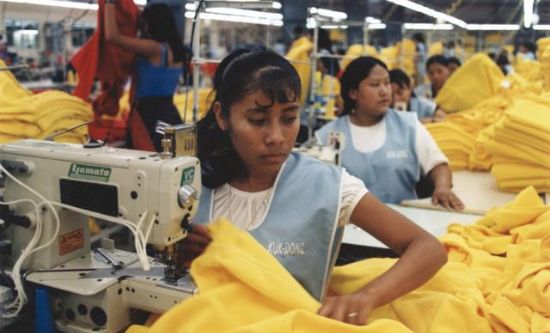
As the government attempted to take the country out of lockdown in June, the lingering high rates of coronavirus infections in Leicester brought new scrutiny to the city’s short-order clothing industry. Rife with illegally low wages, forced overtime and irregular working hours, there are over 1,500 known sites of garment production in Leicester. Often small workshops with poor ventilation, crammed with machinery and textiles alongside exposed wiring and blocked fire escapes, throughout the lockdown these sites have been operating at full capacity filling orders from ‘fast fashion’ brands, chiefly Boohoo Group Ltd, which accounts for 80% of production in Leicester.
Even workers testing positive for coronavirus have been forced to work through sickness to fulfil orders. In such conditions, it is inconceivable that social distancing and other protection measures are being ensured.
Leicester’s sweatshops clothe Britain
‘Leicester clothes the world’ was once the slogan of the Midlands town which developed into a centre of light industry in the 19th century. Generations of migrants have streamed to Leicester to staff its vast factories. The 2011 Census identified just 45% of the population as White British. It also identified 28.3% as British Indians, the highest proportion of any local authority in the country.
Capitalist fabric production, which saw India’s textile industry smashed to create an export market for the Lancashire cotton mills of Britain’s industrial revolution, turned in the later 20th century away from Britain and to the rapidly industrialising Far East. In Britain, apparel manufacturing declined by 69% from 1995 to 2012, while by 2014 consumer prices for clothing were 53% of their 1995 level.
Garment producers in Britain were squeezed harder in the face of low productivity and lack of investment. In Leicester wage freezes, and the racist division of the working class, led hundreds of mainly Asian workers at Imperial Typewriters to strike for 14 weeks from May Day 1974 (see article on our website: ‘Remembering the Imperial Typewriters strike’). The Transport and General Workers’ Union refused to approve the strike and the factory was eventually shut down.
Today Leicester’s production is a shell of its former self, with informal garment sweatshops operating out of dilapidated factory units, including the Imperial factory. The city’s large urban population is more vulnerable than ever to the predation of tight margin outfits taking advantage of state racism.
The state has consistently ignored calls to enforce safety standards in Leicester. The Health and Safety Executive has reduced proactive inspections by more than a third since 2011, and categorised textile factories as ‘low risk’, making them ineligible for proactive inspection. Leicester council last inspected the Imperial Typewriter building in 2004.
The same is true of minimum wage enforcement. In the past decade, the Crown Prosecution Service has brought only seven prosecutions for breaches of National Minimum Wage law. Yet the Home Office has been proactive in enforcing British immigration law, conducting frequent raids on garment factories.
£3 per hour
There is little official data available on Leicester’s so-called ‘dark factories’, but industry analysts agree that, given the prices Boohoo sets in its orders, workers cannot but be earning far below the legal minimum wage.
The campaign group Labour Behind the Label highlights ‘a very recent order for around one million pairs of cycling shorts to be made in Leicester by a small number of suppliers. The price offered was £1.80 per unit – this includes clothing production, factory overheads, packaging, labelling and delivery costs. Both Boohoo.com and PrettyLittleThing are currently selling a variety of cycling shorts from £3 to £10 (discounted)’ (June 2020). Brands place these short, rapid batch orders with middle-man suppliers who fulfil them through unauthorised subcontractors several removes from the monitored supply chain.
A major study published by the University of Leicester Centre for Sustainable Work and Employment Futures in 2015 claimed that 75-90% of jobs in the sector paid an average wage of £3 per hour, less than half the then legal minimum wage of £6.50. An undercover Sunday Times reporter was offered £3.50 an hour to work in the Jaswal Fashions factory making garments branded with the Nasty Gal label (owned by Boohoo). These brands wear a mask of glamorous marketing while their clothes are made by workers on illegal poverty wages.
Employers often consider state welfare payments as ‘wage supplements’ which workers must use to secure minimum subsistence. But even this is only an option for workers who can access benefits — undocumented migrants and those with non-working visas are subject to racist ‘No Recourse to Public Funds’ laws introduced by the Labour government in 1999.
The informal nature of the sector makes it difficult for workers to collectively fight these predations, where destitution and even deportation are only one missed order away.
A handwringing statement from Leicester’s deputy mayor, Councillor Adam Clarke, admitted that no enforcement of safety standards has been made since lockdown:
‘Councils have limited powers when it comes to these issues. They have no powers to check on working conditions inside a building, enforce the minimum wage, or monitor the legality of the workforce.’
Liberal commentators have focused on the ‘supply chain ethics’ of Boohoo and of its consumers, both with respect to its working practices and its environmental waste. But to tackle the conditions that allow Boohoo to flourish we must fight against British state racism and for a state where workers control production, ending exploitation and the production of disposable clothing for which there is little social need.
Adam Grey
FIGHT RACISM! FIGHT IMPERIALISM! 277 August /September 2020




